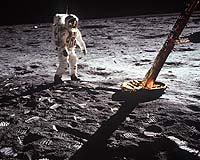 |
Parkes, Australia (AFP) July 12, 2009 In a dry, dusty paddock thousands of miles from Mission Control, a group of Australian astronomers were the first people in the world to witness a giant leap for mankind. It was 12 minutes past 11 am when Apollo 11 appeared over Dead Man's Hill, just outside the Australian capital, Canberra, and engineer Hamish Lindsay was waiting with bated breath. "I'd had six years' preparation for all this, this was the moment I had been trained for," Lindsay told AFP. "I must admit if I stopped and thought about it, which I did a couple of times, I would get goosebumps at what was going to happen." Now 72, Lindsay was in the operations room at the Honeysuckle Creek tracking station, one of three radio telescopes in Australia involved in the Apollo 11 mission. And thanks to Neil Armstrong's decision to attempt the moon walk early, he was among the first in the world to witness man's first steps on the lunar surface. "When it was said that there had to be a rest period after they got down on the moon, that meant it would all be over by the time we could see it," explained David Cooke, who was manning the 64-metre dish at Parkes, some 400 kilometres to the north. "But then Armstrong said 'What are you talking about, we don't want a rest,' and it meant at that very moment he was about to come down on the moon his signal was just coming down over our horizon." Neil "Fox" Mason was behind the controls of the Parkes telescope, manually directing the antenna to receive Apollo's telemetry and other data for a very tense five hours, as unseasonable winds threatened to push the signal off course. "It was blowing (up to) 110 kilometres (68 miles) an hour, a lot more than we would normally observe under, you could feel it going at the walls," Mason said. Racing to get the dish in position at a painstaking 15 degrees an hour, Parkes missed the first few minutes of the television signal, leaving it to Honeysuckle to beam Armstrong's descent and first steps to the world, Lindsay said. "I'm still living those moments even now, 40 years later. It was a real thrill to be involved with something like that." "We were making phenomenal history, to go off into space and throw yourself at the mercy of whatever's out there, we didn't know what was going to happen," he added. Lindsay said the entire moon mission was a fantastically complex undertaking. "Your maths had to be dead right, one decimal point out of place and it was curtains for the astronauts, everything was so critical." Up in Parkes, Mason and Cooke were elated. "There was a picture on a little green TV screen and the time came for Armstrong to get down on the surface, and one of the American operators who'd probably been working on this kind of stuff for years and years just looked at it and said 'How about that'," Cooke said. "I can't remember any cheers, but I was pretty pleased about it all." A proud John Saxon, operations supervisor at Honeysuckle, joked that he noted the exact second Armstrong set foot on the moon in his log "because we had a sweepstake going and I didn't want to upset anyone by getting the wrong time." "There were no high fives or backslaps or handshakes or anything because you're concentrating, you've got to finish the mission," Saxon said. "But all that said, you can walk outside and take a quick breath and look up and say 'Gosh, there's men up there, and we're having something to do with it'." All four men said it was a moment that changed history, bringing together a fractured world by capturing the public's imagination with dreams of the impossible. "400,000 people achieved the impossible in eight years by working together," said Lindsay. "To me, that's the message from Apollo." Share This Article With Planet Earth
Related Links Mars News and Information at MarsDaily.com Lunar Dreams and more
 Walking on the moon: a singular, solitary experience
Walking on the moon: a singular, solitary experienceCape Canaveral, Florida (AFP) July 12, 2009 For the man of faith, walking on the moon challenged and redefined his concept of God and creation. For the scientist, it was a once-in-a-lifetime chance to deepen his knowledge. But astronauts Buzz Aldrin and Harrison Schmitt can agree on one thing: mankind has a duty and a responsibility to continue its adventure in space in our solar system and beyond. Aldrin, now 79, landed on the ... read more |
|
| The content herein, unless otherwise known to be public domain, are Copyright 1995-2009 - SpaceDaily. AFP and UPI Wire Stories are copyright Agence France-Presse and United Press International. ESA Portal Reports are copyright European Space Agency. All NASA sourced material is public domain. Additional copyrights may apply in whole or part to other bona fide parties. Advertising does not imply endorsement,agreement or approval of any opinions, statements or information provided by SpaceDaily on any Web page published or hosted by SpaceDaily. Privacy Statement |